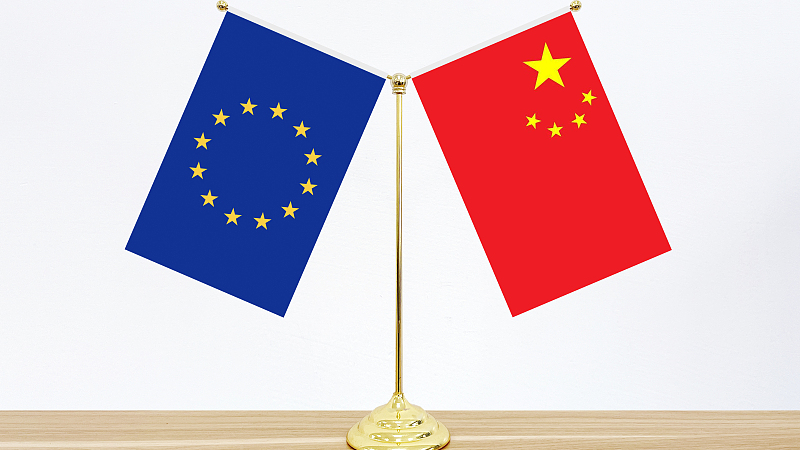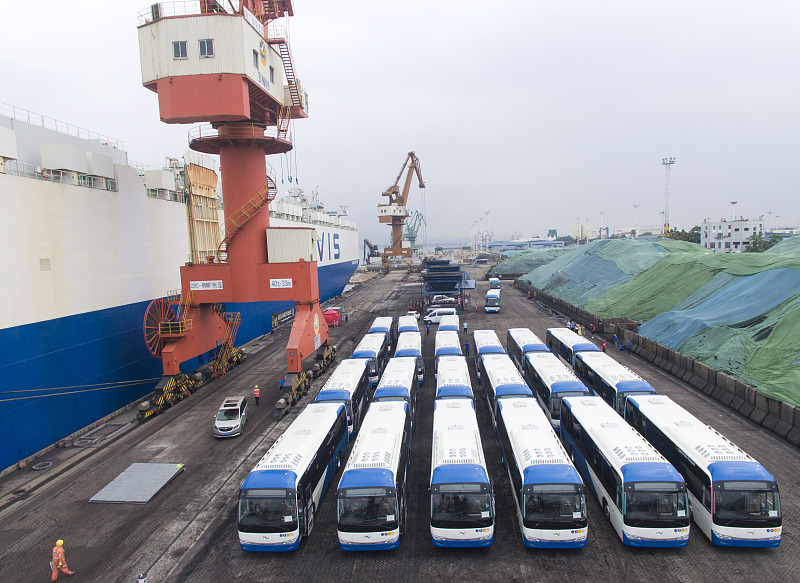
The flag of the European Union and the national flag of China. /CFP
The flag of the European Union and the national flag of China. /CFP
Editor's note: Hamzah Rifaat Hussain, a former visiting fellow at the Stimson Center in Washington and former assistant researcher at the Islamabad Policy Research Institute, is a TV anchor at Indus News in Pakistan. The article reflects the author's opinions and not necessarily those of CGTN.
Ministers of the European Union have been advised to take a tougher stance on Beijing, strengthen cyber and hybrid defenses and deepen ties with other Indo-Pacific countries, according to a paper prepared by the EU's foreign service. Such views and policy papers undercut the importance of a political cooperation between countries in the absence of hostilities. It also sidelines bilateral relationships that China shares with EU countries such as Austria, which is based on mutual respect.
In response, Chinese Foreign Ministry spokesperson Wang Wenbin on October 17 said that China and the EU are partners, not rivals. He emphasized the need to synergize existing gains and capitalize on bilateral ties instead of pursuing reckless competition.
The truth is that greater wisdom must prevail in the EU so that its relationship with China is not held hostage to irritants and spoilers. In light of China placing emphasis on diplomacy and dialogue for a more stable order, the EU should refrain from viewing China as a competitor, which will reduce the possibility of cooperation.
Bilateral trade alone hit $205 billion in the first three months of 2022, which was made possible due to unfettered access of global industry and supply chains. The decision to impose artificial restrictions for political purposes, however, only damages the strategic relationship and prevents joint prosperity from taking hold. Undercutting the China-EU relationship will only add to Europe's economic quagmire and energy crisis, which has exacerbated due to Russia's war with Ukraine.

Buses set sail from China's Xiamen port to Cyprus, May 27, 2020. /CFP
Buses set sail from China's Xiamen port to Cyprus, May 27, 2020. /CFP
Foreign Ministry spokesperson Wang Wenbin spoke about how Chinese products have been important for European consumers and have acted as an important alternative during the economic crisis of 2022. For example, the world's largest wholesale market for daily commodities, Yiwu City in east China's Zhejiang Province, exported $26.5 million worth of products such as heating equipment, air conditioners and electric blankets to Europe in 2022. Perhaps the bloc should consider Wang Wenbin's hopes of the EU viewing strategic cooperation in an objective manner which is critical for the stability of industrial supply chains.
Better sense should prevail in the EU. Contributing to the welfare of citizens of both China and the EU entails capitalizing on existing economic cooperation and ensuring that the relationship doesn't get hijacked by spoilers and irritants pursuing Cold War binaries. Warnings from the German intelligence chiefs, for example, that China could use stakes in critical infrastructure to pursue political objectives must be treated as a fallacy. The conjecture prompted Beijing to respond by urging Germany not to politicize the country's economic relations.
The notion of China attempting to alter the new world order in its own favor is also a fallacy. The EU document mentions that China is leveraging multilateral organizations to promote an alternative vision for the world. The truth is that China has played a constructive role in multilateral organizations such as the United Nations by calling out all states to respect national sovereignty for a more peaceful world. The weakening of the international system cannot be attributed to China, but to the rise of unilateralism and protectionism which has harmed collective prosperity.
For the EU, it is critical to understand the strategic significance of bilateral relations between the two sides. Misperceptions, preconceived notions or flawed narratives on China will not help.
(If you want to contribute and have specific expertise, please contact us at opinions@cgtn.com. Follow @thouse_opinions on Twitter to discover the latest commentaries in the CGTN Opinion Section.)